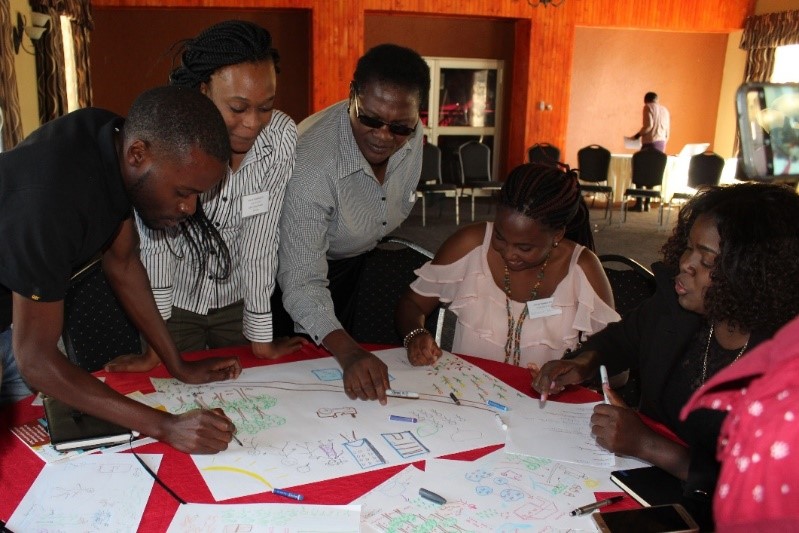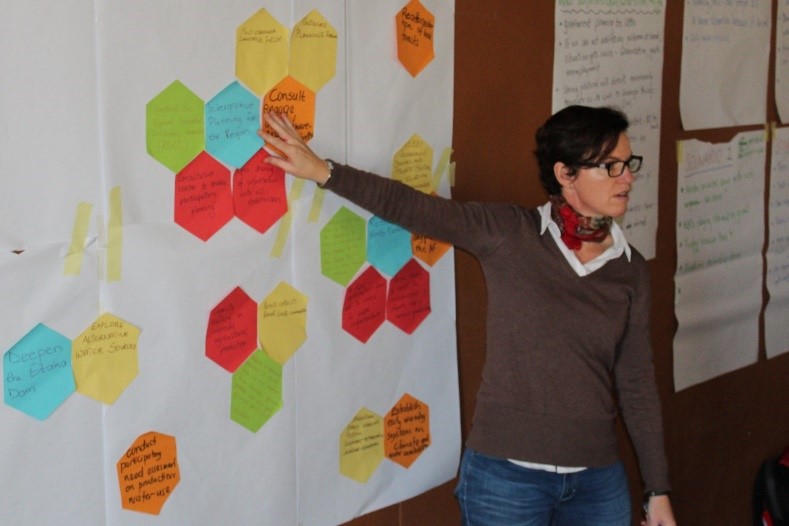Imagining the future of water for productive use in Namibia's Omusati Region

By Cecil Togarepi Researcher, University of Namibia

In the semi-arid regions of northern Namibia, floods and droughts are regular events. However, their severity has increased with the changing climate. The consequences to subsistence and small-scale farmers have been grave in the Omusati Region.
Working with a diverse group of relevant stakeholders over two workshops in February and July 2017, ASSAR’s Southern Africa team implemented the TSP process to imagine what might happen to the provision of water for productive use in the Omusati region of Namibia by the year 2035.
The workshop participant list was dominated by decision-makers – those that have influence or planning roles in different sectors related to water and food security and climate change. Thus representatives of traditional authorities, farmers, farmers associations, hydrology, water regulators, environmental regulators, disaster risk management, councillors, and regional and local government leadership as well as researchers were selected. We found TSP to be a very useful tool for the Omusati Region as it brought together people who wouldn't often be in the same place.
|
TSP enables people to work together on an equal footing with no levels of hierarchy, and opens an avenue of accepting everyone's point of view. |
The TSP process was centred on the topics of political will and the impact of drought on securing water in this region. It enabled people to work together on an equal footing with no levels of hierarchy, and opened an avenue of accepting everyone’s point of view. It suggested that the future might not be controlled by individuals and that collective planning is needed. It also brought new insights, especially for how the same problem could be addressed and looked at holistically.
The diversity of ideas that came up would not have been achieved had it not been for TSP. Different people, depending on their backgrounds, perceive problems differently and apply different methods to addressing issues. However, with TSP the issues had to be separated from individual backgrounds and influences and considered instead in the way events might play out.
The relationships built over the course of these workshops will determine what happens next. The stakeholders and ASSAR team members need to find a way to continue what was set in motion during the workshops, and start implementing the ideas and objectives. The ASSAR team will look into scheduling an additional workshop to support these ongoing collaborative efforts, and to keep working towards a future where people in Omusati have access to water for productive use, regardless of the effects of climate change.

“TSP is an eye opener for planning both in a working environment and personal life. It promotes a sense of ownership because everyone feels part of the entire process. TSP encourages preservation and makes monitoring easier as everyone wants to see the success of each story. TSP helps you to think critically of what you want to achieve.” - Hon Modestus Amutse, Chairperson of Omusati Regional Council
“TSP is a good method of planning with different sectors to change the future. It helped me understand the system in which I am working and relationship between different sectors. TSP can be used by planners and managers who are keen to transform their organisations by bringing up the change they would like to see in the future.” - Mr Silvanus Uunona, Hydrologist, Ministry of Agriculture Water and Forestry
“TSP is a good method for proper planning of the present and the future. TSP has opened up my thinking about the things that can happen and we have no control over and also to be able to let go of beliefs that may not be necessarily of what might happen. I will be able to apply TSP in my short and long term plans.” - Elizabeth Ndivayele, Chief Marine Biologist, Ministry of Fisheries and Marine Resources
This article first appeared in the March 2018 ASSAR Spotlight